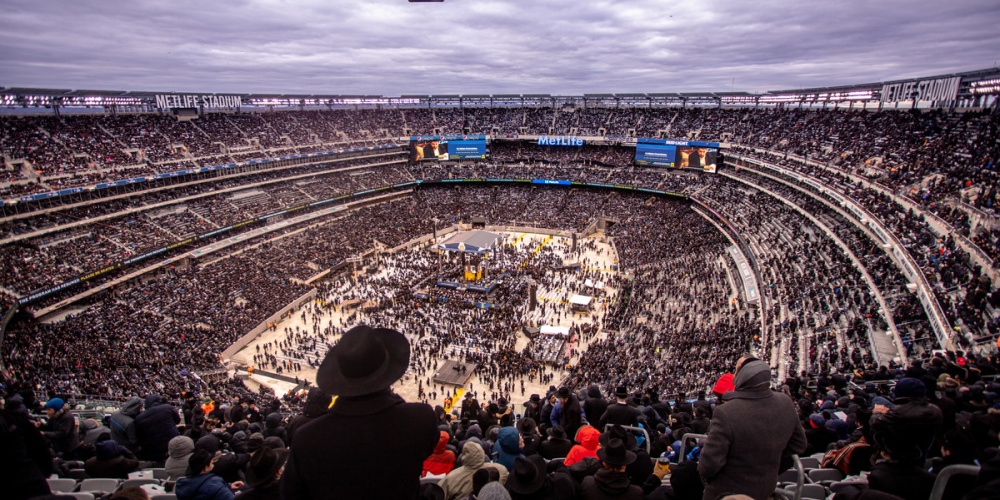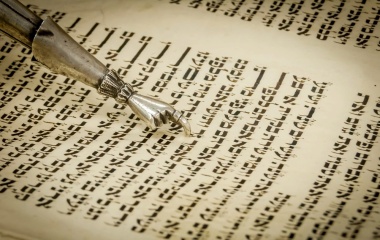
There is something surreal about 92,000 people gathering at a football stadium on New Year’s Day to make a siyum on the entire Talmud. That thousands should gather in a football stadium on New Year's is not at all surprising. Growing up it was the only time I might have watched college football. Between The Rose Bowl, The Sugar Bowl, The Cotton Bowl, The Orange Bowl (am I forgetting any?) there was little else to watch on television. But MetLife Stadium is where the pros play and the pros play on Sundays. So even though the actual new cycle of Daf Yomi begins on Sunday, and will be celebrated around the world on Sunday, it’s just not possible to rent MetLife Stadium on a Sunday during the football season.
Of course, in actual practice there was little reason to be concerned about a Talmud-Football conflict. The first Sunday in January is the beginning of the playoffs in the NFL. And despite having two football teams play in MetLife stadium there is very little need for the stadium during playoff time. The New York Jets last made the playoffs in 2010 – two Daf Yomi cycles ago. The New York Giants are a bit better having last made the playoffs after the 2016 season following a five-year hiatus, though that game was played on the road (where they lost). In other words, in the eight seasons since the last Siyum HaShas was held at MetLife Stadium there have been exactly zero football games played at MetLife Stadium in January. That makes the score Daf Yomi 2, the New York Jets and New York Giants 0. There is "safety" in Talmud study.
“For they [words of Torah] are our life and the length of our days and on them we will meditate day and night” (Maariv). What better place to celebrate those who literally day in and day out, study our beautiful Torah than in MetLife Stadium, named for a company and product which are the essence of Torah. Torah is the greatest insurance policy there is, ensuring the survival of the Jewish people, and something whose “fruit [interest] of which we eat in this world, and the principal endures to the World to Come. It is “the potion of life” (Taanit 7a).
The Talmud teaches in the future the theaters and circuses of Rome will be converted to places where Torah is taught in public (Megillah 6a). The future has arrived.
When I first heard that the Siyum HaShas will be taking place on New Year’s Day, a full four days before the Daf Yomi cycle actually starts again, I could not help but chuckle. I fully understand that with January 1 a legal holiday and most people not working, it makes great practical sense to have the celebration then and not say on the Monday afterwards[1].
What immediately came to mind was a teshuva of Rav Moshe Feinstein, who was—and I have no better words to describe it—a great American patriot. Escaping from communist Russia he famously described America as “a malchut shel chesed, a government of kindness” and even refused to claim any charitable deductions on his tax return, lest not all the funds were properly spent and hence he would be stealing from the government i.e. everybody[2]. Despite coming here in his 30’s he had a great understanding of American life, recognizing he was no longer in Europe, allowing him to become the greatest posek ever on this side of the Atlantic. Yet perhaps because he was not born here, Sunday had religious, even idolatrous, connotations. Hence, Rav Moshe ruled (Even HaEzer 2:13) that one may not make a simcha on a Sunday as such would be a violation ma'arit ayin. Making a simcha on a Sunday makes it appear that one is celebrating the "holiday" of Sunday, something that would be strictly forbidden[3]. Sunday must be meaningless to the Jew[4]. That this teshuva is ignored[5] hardly needs to be said. Jews in America “celebrate” Sundays, not as a religious holiday, but as part of American culture[6][5]. So January 1st it is.
That we are celebrating on New Years is just another indicator of how Jews, even those who claim to eschew the modern culture of America, are so impacted and influenced by it. As a friend of mine who teaches modern Jewish history told me, the typical Yeshiva educated, card carrying member of Agudath Israel of America under whose auspices the Siyum Hashas is being run, is much more acculturated in our surrounding culture than anything Moses Mendelsohn could have hoped for or dreamed of.
And who would have dared dreamed such? That the “treifa medinah”, where fitting in meant throwing off the “yoke of commandments” where one was lucky if one of their children remained observant is witness, to doctors, lawyers, businesspeople, etc. etc. who are tremendously successful in their chosen fields and find the time each and every day to engage in the most sublime of activities, the study of Torah.
There were very few greater dreamers than Rav Meir Shapiro, the visionary who came up with the simple but profound idea of uniting Jews worldwide through the study of a page of Talmud a day. I suspect he himself could never imagine the impact, far and very wide, he would have. Did he imagine that thousands would wake early in the morning day in and day out to learn the daf, many of whom can only understand the Talmud in translation; that there would be groups of women not only learning, but giving shiurim in Daf Yomi, that there would be literally thousands of shiurim on daf yomi available online, that secular newspapers would report and marvel, many on the front page, how Jews around the world study original texts some 2,000 years old? Surely, he could not have envisioned that over 90,000 people would gather at a football stadium on New Year's Day to celebrate.
Even with 2020 hindsight it is hard to imagine the unbelievable influence of Daf Yomi. One can probably count on two hands the number of Orthodox shuls around the world that don’t have a daf yomi shiur, and beautifully even many who do not identify as Orthodox are captivated by the daf.
I can think of no better New Year’s resolution that participating in the study of Torah[7], day in and day out without fail.
[1] I am not quite sure that it is the height of practicality to host a siyum and the long lineup of speakers that will undoubtedly follow, in an outdoor stadium in the middle of winter. But if football fans can sit for hours – some, who for some unfathomable reason, like to take off their shirts – then surely Jews who love Torah can put up with a few hours of unpredictable weather.
[2] Told to me by his son-in-law Rabbi Dr. Moshe Tendler.
[3] Unlike Rav Soloveitchik who celebrated thanksgiving, Rav Moshe did not. One should not eat turkey in celebration of this non-Jewish holiday, he argued, but it is not forbidden to do so.
[4] Rav Moshe did allow one to make a simcha on Sunday if one was obligated to do so on that day i.e. a brit milah. Nonetheless, he discouraged, but did not forbid, both bar-mitzvot (he thought no time was the right time for a bat-mitzvah) and weddings.
[5] The only time I ever saw this being observed was at the Young Israel of Kemp Mill, Silver Spring, under the leadership of Rav Gedaliah Anemer z”l, where (at least when I was last there) davening on Sundays and all legal holidays, took place exactly the same time as every other day of the week.
[6] I don’t think it is overstating the case to claim that for many people one of the hardest things about making aliyah is giving up Sundays. There are many excellent reasons for Israel to adopt Sundays as part of a longer weekend (despite Friday already being a day off for many), not the least of which is the positive impact on religious-secular divide.
[7] This is not the place to discuss the pros and cons of studying Daf Yomi or some other Torah subject. Undoubtedly, the greatest reason to study the daf is the tremendous motivational and psychological power it provides, joining with hundreds of thousands around the world with a clear and defined goal of learning.



